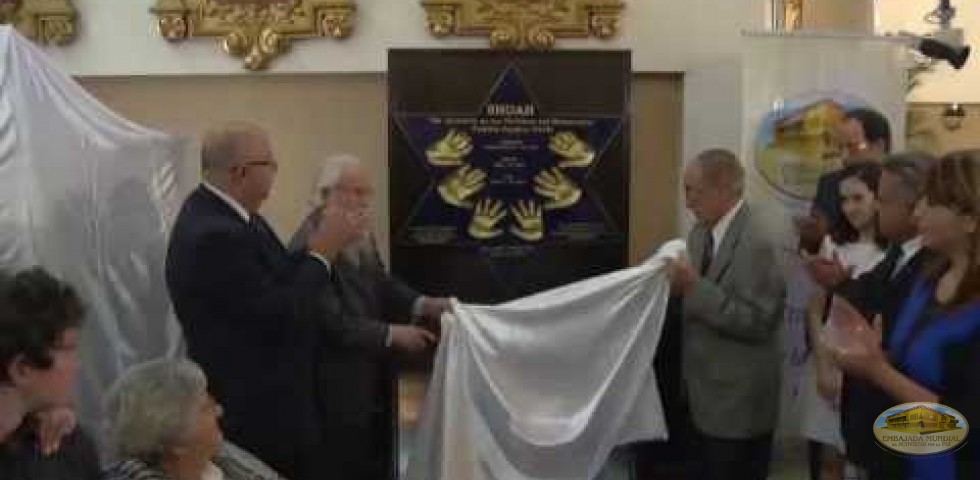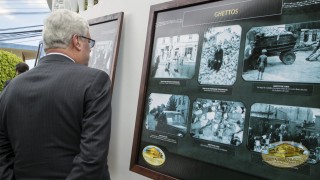Law Proposal is Presented to the Legislative Assembly of Costa Rica to Include the Subject: “The Holocaust, Paradigm of Genocide” into the School System
A proposal was made to the Legislative Assembly of Costa Rica through Traces to Remember, a project which was designed as a tool to teach, prevent and preserve human rights. At the event, governmental officials, political and civic leaders, professors, activists, Holocaust survivors and their families gathered with the objective of promoting opportunities to analyze and raise awareness about the need to prevent another genocide from happening in the history of humanity. The participants agreed that as a preventive measure, it is necessary for present and new generations to be taught based on respect for human dignity and the fundamental rights of human beings.
Project Director Dr. William Soto, President of the Legislative Assembly, Luis Fernando Mendoza Jimenez, Deputy Minister of Foreign Affairs, Carlos Roverssi, and Deputy Justo Orozco Alvarez, were among those present during the presentation of the commemorative plaques of three Holocaust survivors living in Costa Rica.
A Commitment to the Defense of Human Rights
The President of the Assembly opened the session and expressed his support to all projects that promote respect for human dignity.
He stated:
"The Holocaust should always remind us of certain truths, which if forgotten, can destroy civilization. That is why our commitment as a country of peace, respectful of human rights, is to work in unity with every person, organization, institution, or nation that strives to avoid the repetition of events like the Holocaust, seeking to leave behind any anti-Semitic rhetoric."
Carlos Roverssi, Deputy Minister of Foreign Affairs, identified with the objective of "Traces to Remember" and emphasized his commitment to promote projects, programs and activities that defend human rights. He added:
"Part of the evil is also represented in the denial of historical facts. Particularly if related to a human tragedy like the Holocaust, or the genocide of the Hebrew people; it is simply disgraceful. Likewise, it is evil to ask that any state or nation be erased from the planet. For that reason, Doctor, thank you very much. Thank you very much to all of you for making this effort to have that Trace and remind the world of what happened, and what should not happen again."
“The vast majority of genocides, massacres and destruction caused by intolerance, racial, religious and ideological differences, often stem from prejudice, ignorance, lack of tolerance and lack of memory. It is necessary to take preventive actions, using education as a tool to build generations that respect human rights and create paths to peace,”
added Deputy Justo Orozco Alvarez.
The Importance of Education in order to Prevent a New Genocide
Dr. William Soto reiterated the importance to work in the field of education to prevent another genocide. He expressed:
“It is necessary for authorities to be able to create laws that penalize anti-Semitism as a form of discrimination, and condemn Holocaust denial and the proliferation of neo-Nazi groups and their actions, which threaten peace and human dignity. At the same time, however, it is fundamental to go beyond articles and concepts. It is necessary to have a population that is aware and capable of enforcing laws wisely, and this can only be achieved through education."
He also urged authorities to include the Holocaust as a subject of study and debate in high schools and colleges, and as a course of study and a case study in universities through Congressional law.
Holocaust Survivors
The Holocaust survivors present spoke about the importance of being able to tell their story to the world, and thanked Costa Rica for allowing them to live in freedom. Holocaust survivor Salomon Fachler said:
“Very few people in Costa Rica know that I am a World War II refuge. First of all, because I never wanted to talk about matter, second of all, because I rejected the idea. But in recent years, because of what is happening in the world, I decided to speak about the Holocaust when I was asked to do so. What I do is talk about some of the different things I lived through in the Holocaust, and thank Costa Rica, which is now my homeland."
The event concluded with the unveiling of the plaques of Salomon Fachler, Frida Goldberg de Gutreiman, and Guena Wajntraub de Majchel, after which the participants pledged their support to create various projects in defense of human rights.

